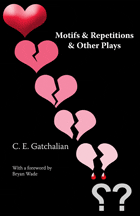 Gene Hayworth
(contact),
our literary reviewer, turns his attention toward a book of plays,
Gene Hayworth
(contact),
our literary reviewer, turns his attention toward a book of plays,Motifs & Repititions & Other Plays
 Motifs & Repetitions
& Other Plays Motifs & Repetitions
& Other Playsby C. E. Gatchalian Cranston, R.I. : Writers' Collective 2003 125 pages, paperback, $9.95 ISBN 1-932133-49-6 To order, phone toll free: 1-800-497-0037 or http://tinyurl.com/523ck The three one-act plays and the monologue that comprise C. E. Gatchalian’s new collection, Motifs & Repetitions & Other Plays, share a common vision. The style is sparse and hypnotic. The characters are so obsessed with speaking that they rarely listen. But one must consider why they do not listen to get at the core of Gatchalian’s narratives. These plays suggest that the construction of human relationships is fragile and easily dismantled. It is better to deflect emotion with a torrent of words then to engage in meaningful conversation, to circumnavigate an issue rather than address it directly, even though what is left unsaid precipitates that destruction. Whether illustrating the dysfunctional nature of a love triangle, the disintegration of a family, or the madness of a singular passionate obsession, Gatchalian suggests that there is always hope that a broken relationship can be salvaged. Critics have compared the playwright to Sarah Kane, Edward Albee and Samuel Beckett. His Minimalist style echoes the works of those authors, especially in his ability to suggest what lies just beneath the surface of a thought, and in his use of circular, repetitive dialogue. The plays, Motifs & repetitions, Hands, Claire, and Star, examine young love, the power balance of relationships, and the frustration of unfulfilled moments. In tandem with these ideas Gatchalian explores sexuality in its variant guises: homosexuality, pedophilia, and incest are just a few of the acts his characters encounter and describe in detail. They have discovered the harsh reality that sex, whether consensual or forced, can be a devastating experience. The title piece, Motifs & Repetitions, was Gatchalian’s first play. It aired on Canada’s Bravo! Channel in 1997 and on the Knowledge Network in 1998. The characters, Cathy, Jeff, and Adrian, form a love triangle. Although they are described by the author as “all in their early twenties, all fairly likeable,” they are too naïve and impressionable to be likeable. They cannot communicate the emotions that boil just beneath the surface, and focus instead on the observed objects they admire, teacups and socks, the physical traits they appreciate in each other—chests, hair, breasts. The couples pair off: Adrian and Cathy, then Cathy and Jeff. Adrian hints at his unrequited feelings for Jeff but cannot put them into words. For Cathy, Jeff represents physical love; Adrian offers her an emotional depth devoid of sexual passion. In Hands, a married couple argues over the fate of their son Junior, a celebrated concert pianist. The three characters are defined by their hands. Every morning Mary sits with her hands “folded in her lap;” Junior’s hands are “like moth wings,” and Philip’s hands have a “certain rough beauty.” Philip and Mary have agreed never to talk about their son in the present tense, for he is a “degenerate” and has been banished from their home. He is dead to them. Over the course of their conversation the audience learns that Mary is guilty of adultery with her husband’s friend, John Senior, a point that is emphasized so often one must consider whether “Junior” is really Philip’s son or John’s. The play revels in miscommunication and double meaning. When Mary asks, “Have you been listening to me?’ her husband replies, “I never listen to you when you talk nonsense.” It does not matter to him that her words are in dead earnest. Junior makes an appearance at the end of the play but he does not speak. His inability to communicate suggests that he is a figment of Mary’s imagination, or that his figurative demise is genuine. Mary and Philip celebrate his death in order to embrace their own. Gatchalian contrasts the emotional pain of the characters in the first two plays with the physical pain suffered by characters in Claire, another one act play that was first produced by Vancouver’s Blinding Light Theatre in 1999. The characters in Claire provide a more visceral examination of sexual violence that includes rape, incest, and murder. Although this is the darkest drama in the collection, it ends on a note of hope. Star, the final monologue in the collection, is a masturbation fantasy involving a young man’s obsession with his younger sister. Like many scenes in the longer plays, the character’s words shock more for what they imply than what they state. Gatchalian studied music and creative writing and received an MFA from the University of British Columbia’s Creative Writing Program in 2003. In addition to plays he has published poetry and fiction and he is also a freelance journalist. His work has appeared in a variety of publications, including the Vancouver Sun, MAS-Zine, and the Muse Apprentice Guild. Motifs & Repetitions & Other Plays was a finalist for the Lambda Literary Award in 2003. Though these plays are recommended reading, like most theatrical pieces they are better suited for live presentation. Hopefully future theater groups will consider them for performance. |  Meet Chris Gatchalian... Meet Chris Gatchalian...C.E. Gatchalian was born in Vancouver in 1974. He is an alumnus of the University of British Columbia’s renowned Creative Writing program (BFA, 1996; MFA, 2003). His first play, "Motifs & Repetitions," aired on Canada's Bravo! channel in 1997 and on the Knowledge Network in 1998. His next play, "Claire," was produced in Vancouver in 1999. He is a freelance journalist for Xtra! West, the Georgia Straight, and the Vancouver Sun, and his fiction and poetry have appeared in such publications as MAS-Zine, the Muse Apprentice Guild and Shampoo. His work appeared in the literary anthology Chasing Halley’s Comet (1995) and his first book, Motifs & Repetitions & Other Plays (2003), was named a finalist for the Lambda Literary Award, which honours the best in gay, lesbian, bisexual and transgendered literature in English. He is the first Filipino-Canadian author to be nominated for a literary award of this magnitude. Reviews "Gatchalian is well on his way to making his mark in contemporary drama."
—Charlie Cho, CBC Radio "Vancouver playwright C.E. Gatchalian creates a one-act play so sexual, so violent and so sexually violent that it could encompass the decades-long traumas of an octogenarian. If a writer expunges demons by putting them down on paper, Gatchalian's young soul must now be clean as a whistle....'Claire' is evidence of greater, and no doubt even more disturbing, things to come from the writer."
—Vancouver Sun
theatre critic
Peter Birnie on Claire Our reviewer... Gene Hayworth grew up in North Carolina and attended undergraduate school at UNC - Greensboro. He worked for 10 years as a layout artist, technical writer, computer specialist and training instructor before returning to school at the University of Rochester, where he received a Masters degree in English with a concentration in creative writing, and an MLS from Syracuse University. He moved to Colorado in 1995 and worked at CARL Corporation for several years, and in the summer of 1999 he worked for CARL in Singapore, which resulted in the publication of an article about his experiences titled "Singapore Libraries Usher in a New Era," in Computers in Libraries, 20:6 (Nov./Dec. 2000). He is an avid reader and has written several book reviews for Colorado Libraries. In February 2003 he prepared an exhibit at the Fales Library, NYU, on the Gay American novelist and playwright Coleman Dowell. His critical study of Dowell appeared in The Review of Contemporary Fiction, Fall, 2002. Currently he works as a reference librarian for the University of Colorado at Boulder Libraries. |